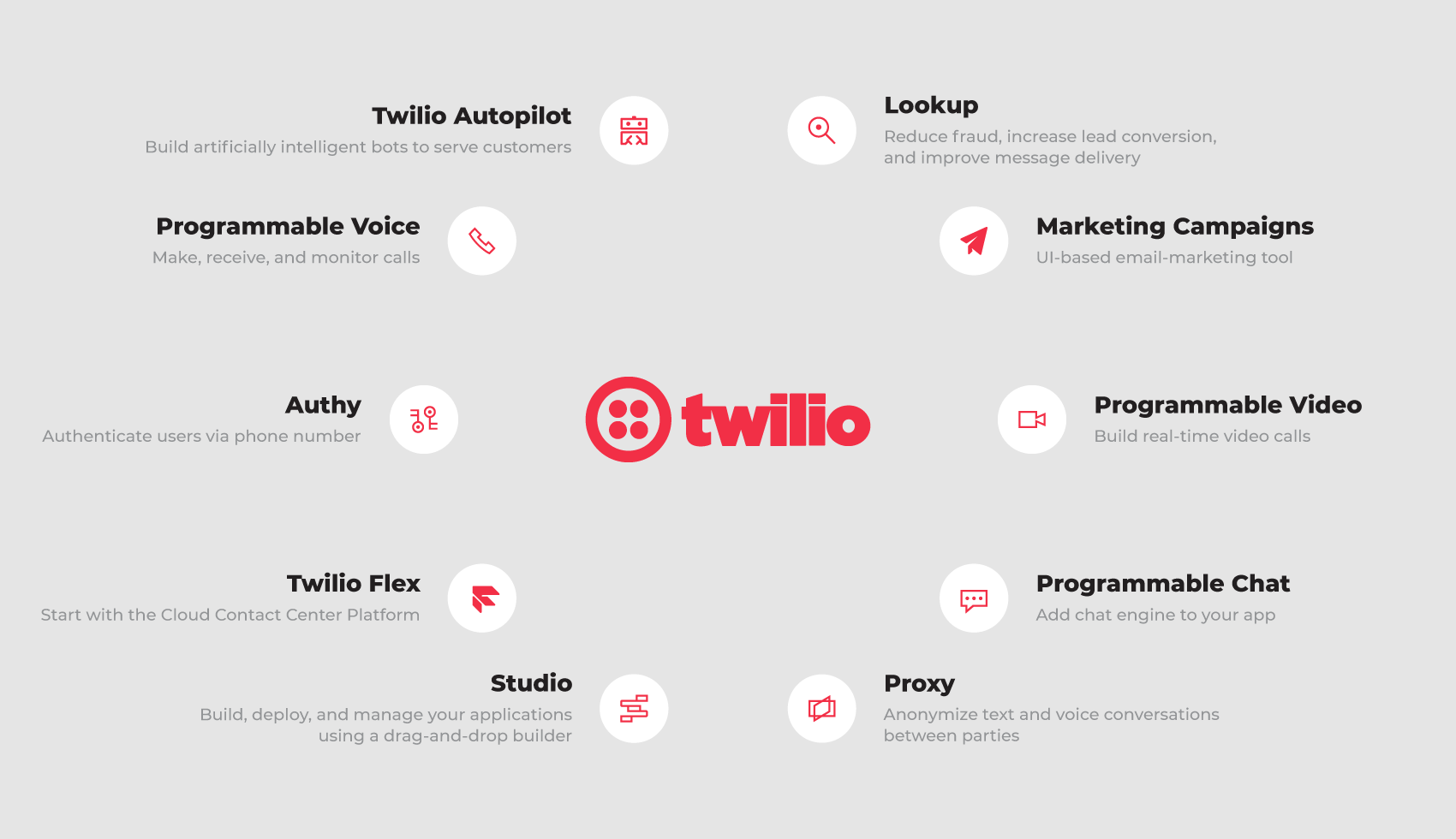- What we do
- Services
- Solutions
- Our Works
- Company
- Contact Us
January 29, 2021
How Twilio Works: An Overview
From simple chats to big corporate communication platforms, every online communication app needs to be built properly to prevent issues from arising down the line with future users. Still, organizing online communication can be a tough task. Here is where big platforms like Twilio come into play. So, what is Twilio? Let us explain!
It’s hard to imagine today’s life without online communication. With the global pandemic impacting all aspects of our daily life, this communication channel has become a major means for people to connect with each other. Video calls, audio chats, text messages, emails—increased significantly in 2020, so the popularity of communication apps skyrocketed.
That is why now being simple and effective is a must-have attribute of any mobile or web chat application. How do you maximize user-friendliness and simplify complex features at the same time, without losing quality in the final product? Services like Twilio were designed to meet these exact needs.
Twilio is a true pioneer in cloud communication and has an efficient development strategy that allows them to have long-term success. In 2020, the company’s shares surged 278%, so the business is strengthening its position.

As a Twilio Bronze Partner, with practical experience with the platform's integration, Yellow is presenting its take on this platform’s major features and advantages.
What is Twilio?
So, what exactly is Twilio? In general, Twilio is a US cloud communication platform as a service (CPaaS) company that launched in 2008. It has since attracted over 200,000 active corporate customers, including Airbnb, Shopify, Netflix, Spotify, and Twitter.
Twilio allows software developers to semi-automatically build business communication processes that enable:
- Making/receiving phone calls
- Sending/receiving text messages
- Launching email campaigns
- Staying connected with customers
Besides, Twilio also automates user verification and marketing campaign monitoring using its web service APIs.
This is a great solution if you need to exchange text messages and files inside an app, make voice and video calls, send or receive verification codes, and create one or several chatbots for your website.
Twilio helps its clients focus on their current goals, like communication with partners, customers, and employees instead of spending a huge amount of time negotiating with mobile operators to solve communication problems.
What does Twilio do?
Twilio has plenty of services that can reduce the time and money spent on app development. Let’s take a closer look at exactly how Twilio can help your project with its:
- Communications APIs for enabling messaging, voice chats, and video conversations
- Programmable connectivity options for providing virtual phone numbers, SIP trunking, and messaging
- Use-case APIs for powering abstraction for authentication, message control, and call routing tasks

Omnichannel communication
Twilio’s APIs can help you create and monitor all types of online communication across multiple channels.
1. Twilio Programmable Chat
For chat and chatbot development, there is Twilio Programmable Chat. The service has a lot of the necessary features for building a well-functioning chat, and they are very easy to set up. They include displaying a person’s online/offline status, sending them push notifications, and saving the message history. Also, Twilio Programmable Chat can help with setting up the deferred message function. This is a particularly useful feature, yet one that’s still unavailable in many messengers and chat platforms.
Overall, Twilio Programmable Chat contains effective and easy-to-use solutions:
- They help you create a chat the way your target audience expects it to be, from the simplest chats with a minimal set of features to advanced chats that even the strictest critic can appreciate
- Apart from text-based chats, it’s also possible to make audio and video calls with the help of Twilio Programmable Voice and Programmable Video
2. Programmable Voice API
Programmable Voice API helps build and monitor calling systems, in addition to supporting the routing of calls to a browser, app, phone, or anywhere else you can receive a call.
3. Programmable Video
Programmable Video provides high-quality video connections that don't depend on network conditions, thanks to the use of WebRTC that Twilio enhances with bandwidth optimization.
Programmable Video API is flexible. For example, it helps you to:
- Deliver an invitation to a video call via SMS
- Create custom layouts
- Integrate live chat and phone dial-in
- Follow up with email surveys to collect feedback from participants
The scope of possible applications of Programmable Video is quite wide: organizing online appointments with a doctor, conducting video conferences and seminars, providing customer service, and managing business workflows, to name a few.
4. Twilio Studio
Twilio Studio can be used to holistically control omnichannel communication processes. With the help of its simple visual interface, it becomes easy to create, edit, and manage communication flows, as well as fast prototyping thanks to its drag-and-drop capability. With Twilio Studio, it’s possible to address basically every digital communication need, from order notifications to phone trees, survey tools, and SMS-enabled chatbots.
This service was extremely useful for us during the development of a client-consultant communication system in one of our projects. We created a trigger system: when a client calls, it triggers a chain of actions for the automated client-consultant communication. This chain could be easily mapped out visually in Twilio Studio.
This logic implied two different flows: one for the client and the other for the consultant. These flows take into account various communication scenarios, and each scenario has its own triggers for the consultant and for the client.
End-to-end contact center support
Twilio Programmable Chat, Voice, and Video can be easily used to build a contact center for customer service. However, to organize all parts of the process, like receiving calls, processing customer requests, sending follow-ups, and so on, Twilio has built a specialized game-changing product — Twilio Flex.
It is the industry’s only fully programmable contact center platform that lets companies deploy multiple customer engagement channels while providing the tools to build, modify, or extend any part of their custom-made solutions. Twilio Flex enables companies to deploy cloud-based contact centers free from the typical limitations of SaaS platforms.
The platform offers many out-of-the-box features, and it not only comes integrated with Twilio products but it also provides a back-end for them as well. This service allows developers to create their own UIs and customize the product logic to fit their individual needs.
With the help of Twilio Flex, we implemented an enterprise cloud-based contact center solution called Telemojo, making use of the service’s powerful developer tools.
While Twilio Flex offers plenty of features, we enhanced our solution with some customizations to meet the project needs. For example, we enabled attaching files and images to messages. As the service doesn’t originally provide for that, our developers set it up manually using Amazon S3 Buckets.
Thanks to choosing Twilio Flex, our client saved time and money on implementation as we could complete Telemojo within just 3.5 months, including development and testing.
Optimize the development of your app with Twilio services. Feel free to contact us to learn more.
Get in touchAll-round messaging
Twilio Messaging is an API for SMS, MMS, and OTT messages operating in a global network. It uses intelligent sending features to ensure messages reach end-users wherever they are. Twilio has SMS-enabled phone numbers available in more than 180 countries.
Twilio also supports email messaging. Twilio gets around the issue of legit emails ending up in spam folders or never reaching the recipient with its Twilio SendGrid API. The Twilio SendGrid API solves those challenges so your company doesn’t have to worry about what happens after you send an email.
Multi-factor user verification
One more extremely useful service is Twilio Verify that helps protect users’ accounts from online fraud, which has grown from a minor issue to a major factor affecting businesses these days. Twilio Verify enables sign-in verification via users’ preferred channels:
- SMS
- Voice
- Push notifications
Twilio Verify smoothly integrates into the sign-up flow, so it becomes easy to monitor authentication processes and manage country-specific number pools.
The advantages of using Twilio
As we can see, Twilio offers a lot of ready-made tools for creating communication solutions. Still, why Twilio? What makes their means worth implementing? We can highlight several advantages:
- Pay-as-you-go—you pay only for the time you actively use Twilio solutions, so there is no need to sign long-term contracts. Also, Twilio offers favorable discounts for its services.
- Easy integration—the Twilio API supports a variety of programming languages like Java, Python, and PHP, and developers start working at maximum speed.
- Regional distribution—it’s easy to customize all the technologies to local needs depending on what country is going to see your product.
- The international presence—Twilio services are available in more than 180 countries.
Also, Twilio services offer good scalability, top-notch security, and high-quality performance. That is why a lot of famous digital companies use their solutions in practice.
Twilio success stories
While you might have never heard about a single Twilio chat example or any of Twilio tools before, you have definitely encountered it. So what brands exactly use Twilio services?
For example, Airbnb partnered with Twilio to build secure mobile communication between hosts and their potential guests. The automated process was set up with masked phone numbers, order notifications, and SMS support. Those services helped Airbnb make a huge cut in their costs since the implementation of a separate SMS infrastructure would cost a fortune.
Another popular service that integrated Twilio into their workflows is Netflix. The real-time account notifications that update you on new movies or offer you something to watch are made with the help of Twilio. Twilio also secures Netflix users’ accounts with two-factor authentication.
Communication and entertainment are not the only industries relying on Twilio. GoCardless is the first global network for recurring payments, and their customer service is empowered by Twilio Programmable Voice. They needed to provide high-quality customer support and track customers’ feedback, and Twilio’s functionality was a perfect match.
Twilio can also help healthcare providers, which is extremely important during the pandemic. CipherHealth is an end-to-end engagement platform that makes communication between healthcare providers and patients run faster and smoother. With the help of Twilio, this service now makes it easier for healthcare providers to allocate resources in critical situations that allow them to conduct automated outreach screenings.
To sum it up
Twilio is a communications platform that can be used to implement practically any digital communication solution, using channels like SMS, WhatsApp, voice, video, email, and even IoT. Chatting with a student group during an online class, getting a meeting reminder, receiving an invitation to a webinar—Twilio services can power everything!
It’s no wonder that today, more than 9 million developers from over 180 countries use Twilio to create customer experience solutions that address constantly evolving business needs.
Overall, Twilio enables businesses to build stronger connections with their customers.
You can do it too by dropping us a line telling us more about your needs, and our Twilio team will get back to you with a solution.
Contact us✔Related article:
Got a project in mind?
Fill in this form or send us an e-mail
Subscribe to new posts.
Get weekly updates on the newest design stories, case studies and tips right in your mailbox.
